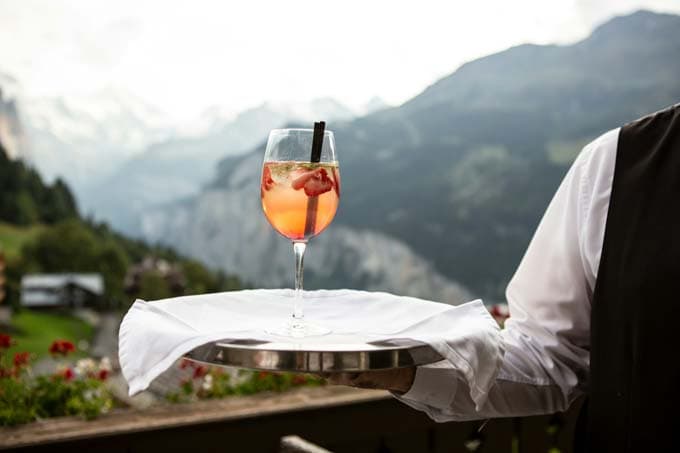Hospitality in Switzerland 2025: What does the future hold?
Tourism and the hospitality industry in Switzerland are booming: according to the trade union Unia, the Swiss hotel industry has never recorded as many overnight stays as in the last two years. Keeping pace with the competition remains a challenge.

As a leading provider of technology solutions for the hospitality industry, we at Oracle present our predictions for the hospitality industry in 2025. Based on our expertise and insights from working with various hospitality companies, we expect the following developments over the next 12 months.
1 AI: From experiment to effect
The strong focus on AI-driven automation in the hospitality industry will evolve from buzzwords and experiments to concrete initiatives that solve acute industry problems and create new opportunities.
From streamlining check-in processes to personalizing the guest experience, AI will improve customer service and offer tailored suggestions such as room upgrades or dining recommendations in real time. Sophisticated gestures, long researched and implemented by experienced concierge staff, were previously limited to the size or resources of the hotel. However, AI can help to efficiently plan, find and implement real services in hotels of all sizes - with minimal effort and low costs.
In the future, AI will support hoteliers in making important decisions by recognizing and monitoring problems that might otherwise go unnoticed. In this way, hotels can make their processes more efficient, react flexibly and make quick, data-based decisions. AI will also change staff planning by optimizing work processes and taking over routine tasks. This gives staff more time to focus on more demanding and valuable tasks.
With open APIs and plug-in marketplaces, hotels can test AI technologies quickly and cost-effectively and receive results within a few weeks, enabling a faster decision to implement or switch to alternative solutions.
2. the controlled journey of the guest: from arrival to the follow-up of the stay
The first innovations in the area of guest-oriented applications were associated with hesitation, resistance and obstacles. Hoteliers, for example, were concerned about sacrificing guest service and disrupting operations. Those days are over. The successful adoption of technology solutions in the hospitality industry has allayed these concerns by enabling improved service and granular control over the guest experience - perfectly aligned with hoteliers' needs.
In the future, guests will have more control and influence to make their trips individual and memorable. Thanks to the multitude of online booking platforms and new providers in the travel industry, such as credit card companies with travel rewards and special offers, new opportunities are opening up for tech-savvy travelers in particular. By cleverly using several loyalty programs, they can combine various benefits and tailor their trips perfectly to their personal wishes.
Hoteliers who embrace innovation and focus on creating unique guest experiences are unlocking significant opportunities. By using technology to support new experiences before and during the stay, hotels can enhance their offering. Technology on and off property is enabling a customer-centric, attribute-based sales approach that allows hotels to go beyond traditional room types and pricing. This evolution allows guests to customize their stay by selecting specific attributes such as a higher floor, a balcony, a connecting room or a mini-kitchen to suit their preferences and needs. Hotels that recognize and capitalize on these partnership opportunities will find themselves at the forefront. Not only in terms of revenue growth, but also in delivering memorable guest experiences.
3. technical consolidation: rationalization of processes, improvement of guest satisfaction
The hospitality industry is at a turning point and technology is at the heart of the change. Hotels have recognized the critical role that technology plays in the success and enhancement of the guest experience. As guest expectations are constantly evolving, it is crucial for hotels and hospitality businesses to stay ahead of the curve. This means not only introducing innovative solutions, but also strategically partnering with technology providers who can simplify their operations and expand their offerings.
By consolidating their technology ecosystems and choosing vendors that offer a comprehensive suite of core solutions, the need to duplicate interfaces and map data between systems, which could lead to friction and silos, can be avoided. In this way, foodservice brands can streamline their operations and reduce the complexity often associated with managing multiple vendors.
This streamlined approach can bring numerous benefits. Working with providers that have a broad range of capabilities can increase cost efficiency. By bundling services and solutions, suppliers can offer more competitive pricing and flexible packages tailored to the individual needs of hospitality operations. This not only simplifies the financial side of supplier management, but also opens up opportunities for cost savings that can be reinvested in improving the guest experience.
Another key benefit of strategic vendor partnerships is the potential for innovation. When hotels and hospitality businesses work closely with technology providers, they can jointly develop solutions that address specific industry challenges and meet the unique needs of their guests. This collaborative approach fosters a culture of innovation that helps hospitality businesses stay at the forefront of the latest developments and offer their guests an exceptional and differentiated experience.
4. sustainability and environmentally conscious innovations will make great progress
With the 2030 sustainability targets only five years away, there will be a renewed focus on sustainability practices and more environmentally conscious technological innovations will be integrated into hotels. This can encompass a variety of areas, such as energy management and smart water monitoring systems that help hoteliers optimize their energy and water consumption respectively.
Furthermore, hotels will increasingly adopt cloud-based and digital platforms that can reduce on-site energy consumption, promote paperless operations and minimize waste. There will be a particular focus on the use of sustainable and recycled materials in products to make the hospitality industry more environmentally friendly from the ground up.
5. security as a competitive advantage
Several notable security breaches over the past year have reminded the hospitality and gaming industry that they are attractive targets for cybercriminals. The exposure of guest data, disruption of operations and damage to brand reputation have served as a stark reminder that security remains a key priority and an ongoing challenge for the hospitality industry.
While security is a necessity, doing more can be a competitive advantage in an increasingly risky digital world. Guests are increasingly sensitive with their personal data, and a breach of trust can lead to a loss of loyalty and significant reputational damage. By treating security as a fundamental aspect of the guest experience, hospitality and hoteliers can ensure that their businesses remain resilient and trustworthy for years to come.
As a direct response to this, we expect an accelerated development towards cloud solutions in secure data centers. The cloud offers advanced security features that on-premise solutions often cannot match. With advanced encryption, multi-factor authentication and robust access controls, cloud solutions can provide stronger protection against cyber-attacks.
By leveraging the expertise and infrastructure of cloud providers such as Oracle, hospitality businesses can benefit from purpose-built, secure data centers. These facilities are designed to protect sensitive data and mitigate risk so that guests' information remains protected and confidential.
In 2025, we are therefore reinforcing the message that safety is at stake. It is the foundation on which both guest trust and brand reputation are built. By prioritizing safety, hospitality businesses can not only protect themselves, but also promote a culture of trust and reliability that resonates with guests.
Author:
Yvan Cognasse is a seasoned digital transformation expert with over 30 years of experience. He is head of the Business Insights and Enterprise Architects team in the Northern Europe region at Oracle and responsible for driving solution growth and maximizing operational excellence. Yvan Cognasse is also a lecturer in digital transformation at HEG Geneva and a keynote speaker on artificial intelligence.
This article originally appeared on m-q.ch - https://www.m-q.ch/de/hospitality-in-der-schweiz-2025-was-bringt-die-zukunft/









